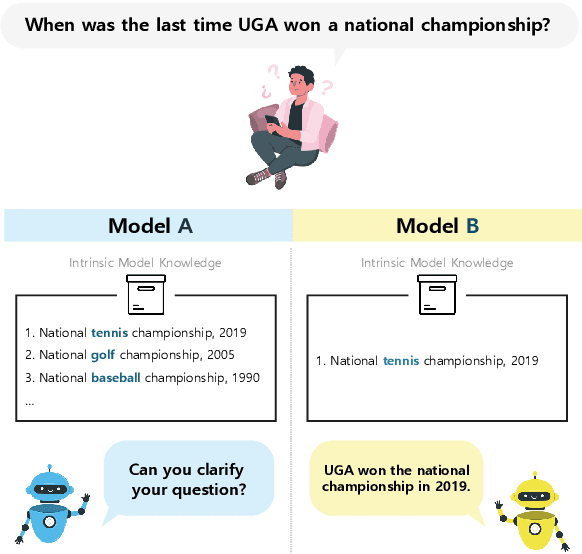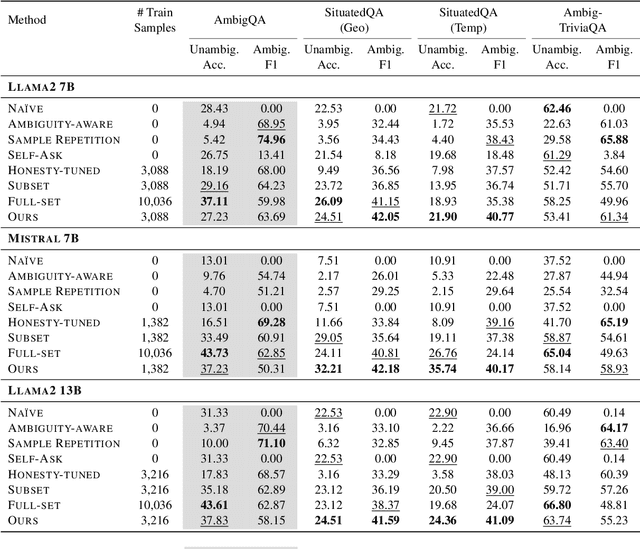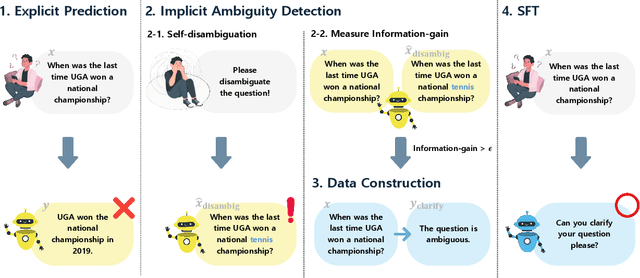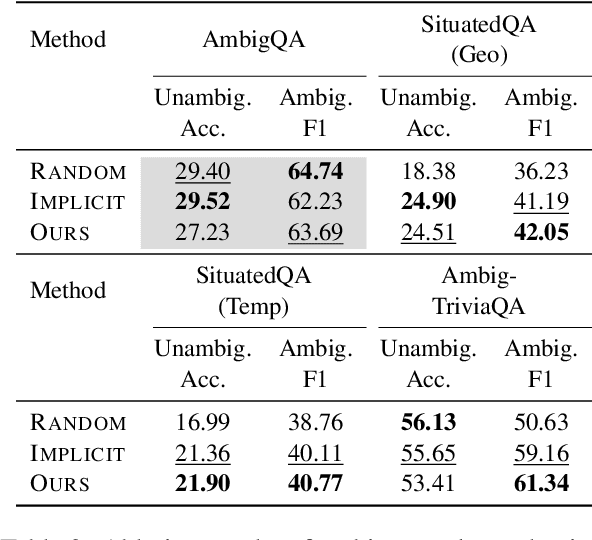Kang Min Yoo
Enhancing Hallucination Detection via Future Context
Jul 28, 2025Abstract:Large Language Models (LLMs) are widely used to generate plausible text on online platforms, without revealing the generation process. As users increasingly encounter such black-box outputs, detecting hallucinations has become a critical challenge. To address this challenge, we focus on developing a hallucination detection framework for black-box generators. Motivated by the observation that hallucinations, once introduced, tend to persist, we sample future contexts. The sampled future contexts provide valuable clues for hallucination detection and can be effectively integrated with various sampling-based methods. We extensively demonstrate performance improvements across multiple methods using our proposed sampling approach.
ReGUIDE: Data Efficient GUI Grounding via Spatial Reasoning and Search
May 21, 2025Abstract:Recent advances in Multimodal Large Language Models (MLLMs) have enabled autonomous agents to interact with computers via Graphical User Interfaces (GUIs), where accurately localizing the coordinates of interface elements (e.g., buttons) is often required for fine-grained actions. However, this remains significantly challenging, leading prior works to rely on large-scale web datasets to improve the grounding accuracy. In this work, we propose Reasoning Graphical User Interface Grounding for Data Efficiency (ReGUIDE), a novel and effective framework for web grounding that enables MLLMs to learn data efficiently through self-generated reasoning and spatial-aware criticism. More specifically, ReGUIDE learns to (i) self-generate a language reasoning process for the localization via online reinforcement learning, and (ii) criticize the prediction using spatial priors that enforce equivariance under input transformations. At inference time, ReGUIDE further boosts performance through a test-time scaling strategy, which combines spatial search with coordinate aggregation. Our experiments demonstrate that ReGUIDE significantly advances web grounding performance across multiple benchmarks, outperforming baselines with substantially fewer training data points (e.g., only 0.2% samples compared to the best open-sourced baselines).
Peri-LN: Revisiting Layer Normalization in the Transformer Architecture
Feb 04, 2025



Abstract:Designing Transformer architectures with the optimal layer normalization (LN) strategy that ensures large-scale training stability and expedite convergence has remained elusive, even in this era of large language models (LLMs). To this end, we present a comprehensive analytical foundation for understanding how different LN strategies influence training dynamics in large-scale Transformer training. Until recently, Pre-LN and Post-LN have long dominated standard practices despite their limitations in large-scale training. However, several open-source large-scale models have recently begun silently adopting a third strategy without much explanation. This strategy places layer normalization (LN) peripherally around sublayers, a design we term Peri-LN. While Peri-LN has demonstrated promising empirical performance, its precise mechanisms and benefits remain almost unexplored. Our in-depth analysis shows that Peri-LN strikes an ideal balance in variance growth -- unlike Pre-LN and Post-LN, which are prone to vanishing gradients and ``massive activations.'' To validate our theoretical insight, we conduct large-scale experiments on Transformers up to 3.2B parameters, showing that Peri-LN consistently achieves more balanced variance growth, steadier gradient flow, and convergence stability. Our results suggest that Peri-LN warrants broader consideration for large-scale Transformer architectures, providing renewed insights into the optimal placement and application of LN.
Adaptive Contrastive Decoding in Retrieval-Augmented Generation for Handling Noisy Contexts
Aug 02, 2024Abstract:When using large language models (LLMs) in knowledge-intensive tasks, such as open-domain question answering, external context can bridge a gap between external knowledge and LLM's parametric knowledge. Recent research has been developed to amplify contextual knowledge over the parametric knowledge of LLM with contrastive decoding approaches. While these approaches could yield truthful responses when relevant context is provided, they are prone to vulnerabilities when faced with noisy contexts. We extend the scope of previous studies to encompass noisy contexts and propose adaptive contrastive decoding (ACD) to leverage contextual influence effectively. ACD demonstrates improvements in open-domain question answering tasks compared to baselines, especially in robustness by remaining undistracted by noisy contexts in retrieval-augmented generation.
LRQ: Optimizing Post-Training Quantization for Large Language Models by Learning Low-Rank Weight-Scaling Matrices
Jul 16, 2024



Abstract:With the commercialization of large language models (LLMs), weight-activation quantization has emerged to compress and accelerate LLMs, achieving high throughput while reducing inference costs. However, existing post-training quantization (PTQ) techniques for quantizing weights and activations of LLMs still suffer from non-negligible accuracy drops, especially on massive multitask language understanding. To address this issue, we propose Low-Rank Quantization (LRQ) $-$ a simple yet effective post-training weight quantization method for LLMs that reconstructs the outputs of an intermediate Transformer block by leveraging low-rank weight-scaling matrices, replacing the conventional full weight-scaling matrices that entail as many learnable scales as their associated weights. Thanks to parameter sharing via low-rank structure, LRQ only needs to learn significantly fewer parameters while enabling the individual scaling of weights, thus boosting the generalization capability of quantized LLMs. We show the superiority of LRQ over prior LLM PTQ works under (i) $8$-bit weight and per-tensor activation quantization, (ii) $4$-bit weight and $8$-bit per-token activation quantization, and (iii) low-bit weight-only quantization schemes. Our code is available at \url{https://github.com/onliwad101/FlexRound_LRQ} to inspire LLM researchers and engineers.
Token-Supervised Value Models for Enhancing Mathematical Reasoning Capabilities of Large Language Models
Jul 12, 2024Abstract:Large Language Models (LLMs) have demonstrated impressive problem-solving capabilities in mathematics through step-by-step reasoning chains. However, they are susceptible to reasoning errors that impact the quality of subsequent reasoning chains and the final answer due to language models' autoregressive token-by-token generating nature. Recent works have proposed adopting external verifiers to guide the generation of reasoning paths, but existing works utilize models that have been trained with step-by-step labels to assess the correctness of token-by-token reasoning chains. Consequently, they struggle to recognize discriminative details of tokens within a reasoning path and lack the ability to evaluate whether an intermediate reasoning path is on a promising track toward the correct final answer. To amend the lack of sound and token-grained math-verification signals, we devise a novel training scheme for verifiers that apply token-level supervision with the expected cumulative reward (i.e., value). Furthermore, we propose a practical formulation of the cumulative reward by reducing it to finding the probability of future correctness of the final answer and thereby enabling the empirical estimation of the value. Experimental results on mathematical reasoning benchmarks show that Token-Supervised Value Model (TVM) can outperform step-by-step verifiers on GSM8K and MATH with Mistral and Llama.
Investigating the Influence of Prompt-Specific Shortcuts in AI Generated Text Detection
Jun 24, 2024



Abstract:AI Generated Text (AIGT) detectors are developed with texts from humans and LLMs of common tasks. Despite the diversity of plausible prompt choices, these datasets are generally constructed with a limited number of prompts. The lack of prompt variation can introduce prompt-specific shortcut features that exist in data collected with the chosen prompt, but do not generalize to others. In this paper, we analyze the impact of such shortcuts in AIGT detection. We propose Feedback-based Adversarial Instruction List Optimization (FAILOpt), an attack that searches for instructions deceptive to AIGT detectors exploiting prompt-specific shortcuts. FAILOpt effectively drops the detection performance of the target detector, comparable to other attacks based on adversarial in-context examples. We also utilize our method to enhance the robustness of the detector by mitigating the shortcuts. Based on the findings, we further train the classifier with the dataset augmented by FAILOpt prompt. The augmented classifier exhibits improvements across generation models, tasks, and attacks. Our code will be available at https://github.com/zxcvvxcz/FAILOpt.
Aligning Language Models to Explicitly Handle Ambiguity
Apr 18, 2024



Abstract:In spoken languages, utterances are often shaped to be incomplete or vague for efficiency. This can lead to varying interpretations of the same input, based on different assumptions about the context. To ensure reliable user-model interactions in such scenarios, it is crucial for models to adeptly handle the inherent ambiguity in user queries. However, conversational agents built upon even the most recent large language models (LLMs) face challenges in processing ambiguous inputs, primarily due to the following two hurdles: (1) LLMs are not directly trained to handle inputs that are too ambiguous to be properly managed; (2) the degree of ambiguity in an input can vary according to the intrinsic knowledge of the LLMs, which is difficult to investigate. To address these issues, this paper proposes a method to align LLMs to explicitly handle ambiguous inputs. Specifically, we introduce a proxy task that guides LLMs to utilize their intrinsic knowledge to self-disambiguate a given input. We quantify the information gain from the disambiguation procedure as a measure of the extent to which the models perceive their inputs as ambiguous. This measure serves as a cue for selecting samples deemed ambiguous from the models' perspectives, which are then utilized for alignment. Experimental results from several question-answering datasets demonstrate that the LLMs fine-tuned with our approach are capable of handling ambiguous inputs while still performing competitively on clear questions within the task.
HyperCLOVA X Technical Report
Apr 13, 2024Abstract:We introduce HyperCLOVA X, a family of large language models (LLMs) tailored to the Korean language and culture, along with competitive capabilities in English, math, and coding. HyperCLOVA X was trained on a balanced mix of Korean, English, and code data, followed by instruction-tuning with high-quality human-annotated datasets while abiding by strict safety guidelines reflecting our commitment to responsible AI. The model is evaluated across various benchmarks, including comprehensive reasoning, knowledge, commonsense, factuality, coding, math, chatting, instruction-following, and harmlessness, in both Korean and English. HyperCLOVA X exhibits strong reasoning capabilities in Korean backed by a deep understanding of the language and cultural nuances. Further analysis of the inherent bilingual nature and its extension to multilingualism highlights the model's cross-lingual proficiency and strong generalization ability to untargeted languages, including machine translation between several language pairs and cross-lingual inference tasks. We believe that HyperCLOVA X can provide helpful guidance for regions or countries in developing their sovereign LLMs.
KMMLU: Measuring Massive Multitask Language Understanding in Korean
Feb 18, 2024



Abstract:We propose KMMLU, a new Korean benchmark with 35,030 expert-level multiple-choice questions across 45 subjects ranging from humanities to STEM. Unlike previous Korean benchmarks that are translated from existing English benchmarks, KMMLU is collected from original Korean exams, capturing linguistic and cultural aspects of the Korean language. We test 26 publically available and proprietary LLMs, identifying significant room for improvement. The best publicly available model achieves 50.54% on KMMLU, far below the average human performance of 62.6%. This model was primarily trained for English and Chinese, not Korean. Current LLMs tailored to Korean, such as Polyglot-Ko, perform far worse. Surprisingly, even the most capable proprietary LLMs, e.g., GPT-4 and HyperCLOVA X, achieve 59.95% and 53.40%, respectively. This suggests that further work is needed to improve Korean LLMs, and KMMLU offers the right tool to track this progress. We make our dataset publicly available on the Hugging Face Hub and integrate the benchmark into EleutherAI's Language Model Evaluation Harness.
 Add to Chrome
Add to Chrome Add to Firefox
Add to Firefox Add to Edge
Add to Edge